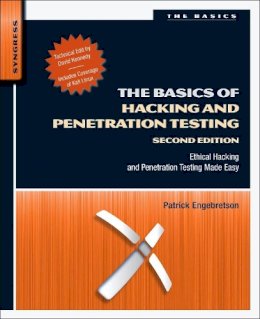23%OFF

Stock image for illustration purposes only - book cover, edition or condition may vary.
The Basics of Hacking and Penetration Testing: Ethical Hacking and Penetration Testing Made Easy
Patrick Engebretson
€ 32.99
€ 25.49
FREE Delivery in Ireland
Description for The Basics of Hacking and Penetration Testing: Ethical Hacking and Penetration Testing Made Easy
Paperback. Serves as an introduction to the steps required to complete a penetration test or perform an ethical hack. This title helps you learn how to properly utilize and interpret the results of modern day hacking tools; which are required to complete a penetration test. Num Pages: 225 pages, Illustrated. BIC Classification: URH. Category: (P) Professional & Vocational. Dimension: 230 x 189 x 14. Weight in Grams: 422.
The Basics of Hacking and Penetration Testing, Second Edition, serves as an introduction to the steps required to complete a penetration test or perform an ethical hack from beginning to end. The book teaches students how to properly utilize and interpret the results of the modern-day hacking tools required to complete a penetration test. It provides a simple and clean explanation of how to effectively utilize these tools, along with a four-step methodology for conducting a penetration test or hack, thus equipping students with the know-how required to jump start their careers and gain a better understanding of offensive security. Each chapter contains hands-on examples and exercises that are designed to teach learners how to interpret results and utilize those results in later phases. Tool coverage includes: Backtrack Linux, Google reconnaissance, MetaGooFil, dig, Nmap, Nessus, Metasploit, Fast Track Autopwn, Netcat, and Hacker Defender rootkit. This is complemented by PowerPoint slides for use in class. This book is an ideal resource for security consultants, beginning InfoSec professionals, and students.
Product Details
Publisher
Syngress Media,U.S.
Number of pages
225
Format
Paperback
Publication date
2013
Condition
New
Number of Pages
225
Place of Publication
Rockland, MA, United States
ISBN
9780124116443
SKU
V9780124116443
Shipping Time
Usually ships in 4 to 8 working days
Ref
99-1
About Patrick Engebretson
Dr. Patrick Engebretson obtained his Doctor of Science degree with a specialization in Information Security from Dakota State University. He served as Dean of The Beacom College from 2020-2023. Prior to serving as dean, he was Chief Information Officer for East River Electric. Before joining East River, Dr. Engebretson worked for the Department of Defense, where he focused on cyber security projects. He also served as a tenured Associate Professor of Computer and Network Security, teaching undergraduate and graduate courses in information security including penetration testing, intrusion detection, exploitation, and malware. Dr. Engebretson has been invited by the Department of Homeland Security to share his research at the Software Assurance Forum in Washington, DC and has also spoken at Black Hat in Las Vegas. His research interests include penetration testing, hacking, intrusion detection, exploitation, honey pots, and malware.
Reviews for The Basics of Hacking and Penetration Testing: Ethical Hacking and Penetration Testing Made Easy
"...this is meant to be a practical book, and it positively encourages you to download, fire up and use the tools mentioned. The first chapter even tells you how to set up your own ‘hacking lab’. So whatever your interest in hacking, you’ll get the most out of the book if you follow along."
Network Security,Aug 1 2013 "For people looking to become pen-testers, this is an excellent first step. For anyone simply curious about what pen-testing involves and who wants to try some of the techniques for themselves, it may be all you need."
Network Security, December 2011
Network Security,Aug 1 2013 "For people looking to become pen-testers, this is an excellent first step. For anyone simply curious about what pen-testing involves and who wants to try some of the techniques for themselves, it may be all you need."
Network Security, December 2011
